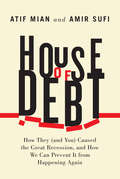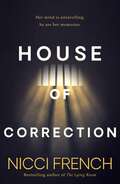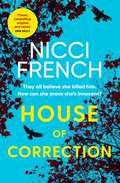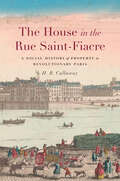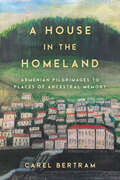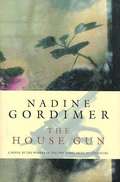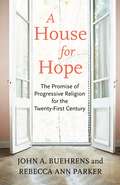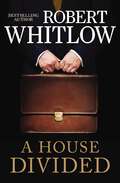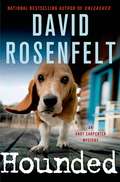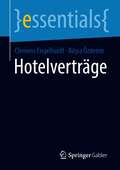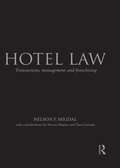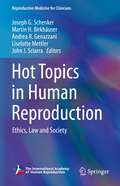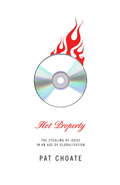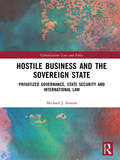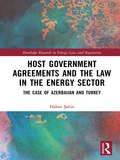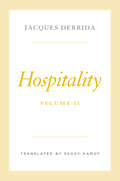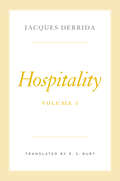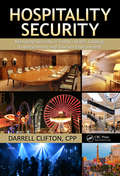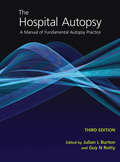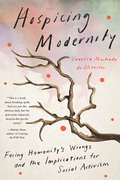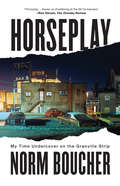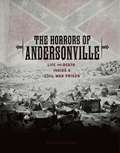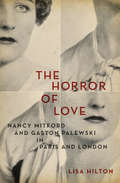- Table View
- List View
The House That Jack Built (Matthew Hope #8)
by Ed McbainAfter Ralph Parrish exchanges angry words with his brother Jonathan, he is charged with murder when Jonathan is found dead on the kitchen floor.
House of Trump, House of Putin: The Untold Story of Donald Trump and the Russian Mafia
by Craig UngerHouse of Trump, House of Putin offers the first comprehensive investigation into the decades-long relationship among Donald Trump, Vladimir Putin, and the Russian Mafia that ultimately helped win Trump the White House. <p><p>It is a chilling story that begins in the 1970s, when Trump made his first splash in the booming, money-drenched world of New York real estate, and ends with Trump’s inauguration as president of the United States. That moment was the culmination of Vladimir Putin’s long mission to undermine Western democracy, a mission that he and his hand-selected group of oligarchs and Mafia kingpins had ensnared Trump in, starting more than twenty years ago with the massive bailout of a string of sensational Trump hotel and casino failures in Atlantic City. <p><p> This book confirms the most incredible American paranoias about Russian malevolence. To most, it will be a hair-raising revelation that the Cold War did not end in 1991—that it merely evolved, with Trump’s apartments offering the perfect vehicle for billions of dollars to leave the collapsing Soviet Union. In House of Trump, House of Putin, Craig Unger methodically traces the deep-rooted alliance between the highest echelons of American political operatives and the biggest players in the frightening underworld of the Russian Mafia. <p><p>He traces Donald Trump’s sordid ascent from foundering real estate tycoon to leader of the free world. He traces Russia’s phoenixlike rise from the ashes of the post–Cold War Soviet Union as well as its ceaseless covert efforts to retaliate against the West and reclaim its status as a global superpower. <p><p>Without Trump, Russia would have lacked a key component in its attempts to return to imperial greatness. Without Russia, Trump would not be president. This essential book is crucial to understanding the real powers at play in the shadows of today’s world. <P><b>A New York Times Bestseller</b>
House of Debt: How They (and You) Caused the Great Recession, and How We Can Prevent It from Happening Again
by Atif Mian Amir Sufi<p>The Great American Recession resulted in the loss of eight million jobs between 2007 and 2009. More than four million homes were lost to foreclosures. Is it a coincidence that the United States witnessed a dramatic rise in household debt in the years before the recession―that the total amount of debt for American households doubled between 2000 and 2007 to $14 trillion? Definitely not. Armed with clear and powerful evidence, Atif Mian and Amir Sufi reveal in <i>House of Debt</i> how the Great Recession and Great Depression, as well as the current economic malaise in Europe, were caused by a large run-up in household debt followed by a significantly large drop in household spending. <p>Though the banking crisis captured the public’s attention, Mian and Sufi argue strongly with actual data that current policy is too heavily biased toward protecting banks and creditors. Increasing the flow of credit, they show, is disastrously counterproductive when the fundamental problem is too much debt. As their research shows, excessive household debt leads to foreclosures, causing individuals to spend less and save more. Less spending means less demand for goods, followed by declines in production and huge job losses. How do we end such a cycle? With a direct attack on debt, say Mian and Sufi. More aggressive debt forgiveness after the crash helps, but as they illustrate, we can be rid of painful bubble-and-bust episodes only if the financial system moves away from its reliance on inflexible debt contracts. As an example, they propose new mortgage contracts that are built on the principle of risk-sharing, a concept that would have prevented the housing bubble from emerging in the first place. <p>Thoroughly grounded in compelling economic evidence, <i>House of Debt</i> offers convincing answers to some of the most important questions facing the modern economy today: Why do severe recessions happen? Could we have prevented the Great Recession and its consequences? And what actions are needed to prevent such crises going forward?</p>
House of Correction: A twisty and shocking thriller from the master of psychological suspense
by Nicci French*** A BRAND NEW NOVEL FROM THE MASTER OF PSYCHOLOGICAL SUSPENSE *** Tabitha is accused of murder. She is in prison awaiting trial. There is a strong case against her, and she can&’t remember what happened on December 21st. Somehow, from the confines of her cell, she needs to prove everyone wrong.House of Correction is beautifully written, clever, shocking, twisty, so believable and utterly compelling. This is another stunningly brilliant novel to relish from Nicci French.Praise for The Lying Room 'Confirms Nicci French as the giant of the genre, upon whose shoulders other writers stand' Erin Kelly &‘It&’s Nicci French perfection – which, as we all know, is the best kind of perfection. So, so gripping and brilliantly clued' Sophie Hannah &‘Reasserts Nicci French as the master of duplicity, suspense and sleight of hand&’ Sam Baker 'From the very first page, Nicci French remains one step ahead of us. Expertly paced, psychologically sharp, thoroughly enjoyable' Louise Candlish &‘You know a book's gripping when you sneak away at any opportunity to read it. Meticulously plotted, psychologically astute&’ Sarah Vaughan &‘A pure adrenaline rush!&’ Jenny Colgan &‘A multi-layered plot that keeps you guessing until the final page&’ Jane Corry
House of Correction: A twisty and shocking thriller from the master of psychological suspense
by Nicci FrenchTHE NEW THRILLER FROM THE MASTER OF PSYCHOLOGICAL SUSPENSE She&’s a murderer. Everyone knows she killed Stuart Rees – why else would his dead body be found in her shed? So now Tabitha is in prison, awaiting trial. Coming back to the remote coastal village where she grew up was a mistake. She didn&’t fit in then, and she doesn&’t fit in now. That day is such a blur, she can&’t remember clearly what happened. There is something she is missing, something important… She only knows one thing. She is not capable of murder. And the only one she can trust to help her out of this situation is herself. So she must fight. Against the odds. For her life. Beautifully written about prejudice, loneliness and fighting spirit, this new book by Nicci French is shocking, twisty and utterly compelling. Praise for House of Correction: &‘Great writing, razor-sharp plotting, and powerful characterisation. I was 100 pages in before I even drew breath, and I defy anyone to see the ending coming&’ Cara Hunter &‘Part ingenious locked-room mystery. Part you&’ve-got-thewrong-person nightmare drama. Part intricate memory game. Yet all seamlessly woven together. French&’s best book yet&’ A J Finn &‘Clever, compelling, original and twisty. This unputdownable David-and-Goliath story has the flawed, funny, totally unforgettable Tabitha at its heart and I read until the early hours, desperate to know her fate&’ Erin Kelly
The House in the Rue Saint-Fiacre: A Social History of Property in Revolutionary Paris (Harvard Historical Studies)
by H. B. CallawayA bold account of property reform during the French Revolution, arguing that the lofty democratic ideals enshrined by revolutionary leaders were rarely secured in practice—with lasting consequences.Property reform was at the heart of the French Revolution. As lawmakers proclaimed at the time, and as historians have long echoed, the Revolution created modern property rights. Under the new regime, property was redefined as an individual right to which all citizens were entitled. Yet as the state seized assets and prepared them for sale, administrators quickly found that realizing the dream of democratic property rights was far more complicated than simply rewriting laws.H. B. Callaway sifts through records on Parisian émigrés who fled the country during the Revolution, leaving behind property that the state tried to confiscate. Immediately, officials faced difficult questions about what constituted property, how to prove ownership, and how to navigate the complexities of credit arrangements and family lineage. Mothers fought to protect the inheritances of their children, tenants angled to avoid rent payments, and creditors sought their dues. In attempting to execute policy, administrators regularly exercised their own judgment on the validity of claims. Their records reveal far more continuity between the Old Regime and revolutionary practices than the law proclaimed. Property ownership continued to depend on webs of connections beyond the citizen-state relationship, reinforced by customary law and inheritance traditions. The resulting property system was a product of contingent, on-the-ground negotiations as much as revolutionary law.The House in the Rue Saint-Fiacre takes stock of the contradictions on which modern property rights were founded. As Callaway shows, the property confiscations of Parisian émigrés are a powerful, clarifying lens on the idea of ownership even as it exists today.
A House in the Homeland: Armenian Pilgrimages to Places of Ancestral Memory (Worlding the Middle East)
by Carel BertramA powerful examination of soulful journeys made to recover memory and recuperate stolen pasts in the face of unspeakable histories. Survivors of the Armenian Genocide of 1915 took refuge across the globe. Traumatized by unspeakable brutalities, the idea of returning to their homeland was unthinkable. But decades later, some children and grandchildren felt compelled to travel back, having heard stories of family wholeness in beloved homes and of cherished ancestral towns and villages once in Ottoman Armenia, today in the Republic of Turkey. Hoping to satisfy spiritual yearnings, this new generation called themselves pilgrims—and their journeys, pilgrimages. Carel Bertram joined scores of these pilgrims on over a dozen pilgrimages, and amassed accounts from hundreds more who made these journeys. In telling their stories, A House in the Homeland documents how pilgrims encountered the ancestral house, village, or town as both real and metaphorical centerpieces of family history. Bertram recounts the moving, restorative connections pilgrims made, and illuminates how the ancestral house, as a spiritual place, offers an opening to a wellspring of humanity in sites that might otherwise be defined solely by tragic loss. As an exploration of the powerful links between memory and place, house and homeland, rupture and continuity, these Armenian stories reflect the resilience of diaspora in the face of the savage reaches of trauma, separation, and exile in ways that each of us, whatever our history, can recognize.
The House Gun
by Nadine GordimerNadine Gordimer's novel is a passionate narrative of the complex manifestations of that final test of human relations we call love. It moves with the restless pace of living itself; if it is a parable of present violence, it is also an affirmation of the will to reconciliation that starts where it must, between individual men and women.
A House for Hope: The Promise of Progressive Religion for the Twenty-first Century
by John A. Buehrens Rebecca Ann ParkerFor over a generation, conservative religion has seemed dominant in America. But there are signs of a strengthening liberal religious movement. For it to flourish, laypeople need a sense of their theological heritage. A House for Hope lays out, in lively and engaging language, the theological house that religious liberalism has inherited--and suggests how this heritage will need to be spiritually and theologically transformed. With chapters that suggest liberal religious commitment is based on common hopes and an expansive love for life, A House for Hope shows how religious liberals have countered fundamentalists for generations, and provides progressives with a theological and spiritual foundation for the years ahead.
A House Divided
by Robert WhitlowCorbin Gage can stand up to anyone . . . But his own divided house will bring him to his knees. Corbin, a longtime legal champion for the downtrodden, is slowly drinking himself into the grave. His love for "mountain water" has cost him his marriage to the godliest woman he knows, ruined his relationship with his daughter, Roxy, and reduced the business at his small Georgia law firm to a level where he can barely keep the bill collectors at bay. But it isn't until his son, Ray, threatens to limit Corbin's time with his grandson that Corbin begins to acknowledge he might have a problem. Despite the mess that surrounds his personal life and against the advice of everyone he knows, Corbin takes on a high-stakes tort case on behalf of two boys who have contracted non-Hodgkin's lymphoma due to an alleged chemical exposure. The defendant, a fertilizer company, is the largest employer in the area. The lawsuit becomes a tornado that sucks Corbin, Ray, and Roxy into an increasingly deadly vortex. Equally intense pressure within the family threatens to destroy, once and for all, the thin threads that connect them. Corbin must find the strength to stand up to his personal demons. Justice for two dying boys depends on it . . . his family depends on it. "Fans of John Grisham will find much to like here." --Library Journal of The Confession
Hounded (Andy Carpenter Book #12)
by David RosenfeltAndy Carpenter isn't sure what to think when he gets a mysterious phone call from a good friend, policeman Pete Stanton, asking him to drop everything, drive to an unfamiliar address, and bring his girlfriend, Laurie Collins. He certainly isn't expecting to show up at a crime scene. But that's exactly where he arrives--at the house where Pete has just discovered the body of ex-convict Danny Diza. Upstairs are Danny's now orphaned eight-year-old son and basset hound. And that, Andy discovers,is why he and Laurie were called to the scene--Pete wants them to take care of the boy and the dog so they won't get thrown into the "system. " This is already asking a lot, but soon Pete needs another big favor from Andy. Pete himself has come under suspicion for Danny's murder, and he needs defense attorney Andy to represent him--and to find out what really happened in Danny's house that day. David Rosenfelt has done it again. Told with his characteristic humor and wit,Hounded is at once a heartfelt story about family and a page-turning legal thriller.
Hotelverträge (essentials)
by Clemens Engelhardt Büşra ÖzdemirIn diesem essential erhält der Leser einen Überblick über gängige Hotelbetreiberverträge wie Miete, Pacht, Management, Franchise und deren jeweilige Wirkweise. Die Vertragsinhalte werden prägnant und praxisnah erläutert und bildlich dargestellt.
Hotel Law: Transactions, Management and Franchising
by Nelson MigdalHotel Law, Transactions, Management and Franchising presents a practical guide to the issues that face lawyers and industry leaders working in the hospitality field. It aims to develop the reader’s understanding of the acquisition process and the complex relationships in management and franchise deals that dominate the hotel industry. This text is written primarily as a desktop reference for legal practitioners working in the hotel law field and is also suitable for students studying towards hotel and hospitality careers both at an undergraduate and law school or graduate level. The highly experienced author, contributors and editors offer insights into the industry players and their preferred positions, desired outcomes, and the potential pitfalls that can ensnare even the most well-planned deals. With broad coverage of the rapidly growing field of hospitality law—including gaming, recreation, and amenities— the book’s approach examines the dominant models of hotel ownership, management and franchising, and includes independent hotels and the move towards complex resorts. The book’s coverage of key legal topics ranges from real estate, to intellectual property, contracts, and finance.Hotel Law will give readers an understanding of the hospitality industry from the perspective of the transactional practitioner, while examining the multi-party relationships and agreements that develop between an owner, operator, licensor and lender.
Hot Topics in Human Reproduction: Ethics, Law and Society (Reproductive Medicine for Clinicians #3)
by Joseph G. Schenker Martin H. Birkhaeuser Andrea R. Genazzani Liselotte Mettler John J. SciarraThis new volume in the Reproductive Medicine for Clinicians series of the International Academy of Human Reproduction (IAHR) focuses on current hot topics in the field, their ethical and legal aspects and their impact on society.It covers topics such as Covid-19, religious and philosophical controversies, possibilities that new technologies offer, human reproductive cloning problems, future challenges related to the heritable gene editing, therapeutic use of stem cells and stem cell factors and the role of receptors in steroids hormone action.This volume also offers an analysis of important innovations and new possibilities such as the use of artificial intelligence in reproductive medicine and the future of prenatal testing. The volume also discusses the issues of pregnancies in advanced paternal age, ethical and legal aspects of gametes donation, sex preselection, surrogate motherhood and infertility in overweight or obese PCOS patients. Chapters on the ethical and legal aspects of fertility preservation in woman, in children with cancer, and in patients sparing treatments in gynecological oncology are also included. This new volume in the series is a valuable resource for gynecologists, obstetricians, endocrinologists, general practitioners and all specialists dealing with reproductive health.
Hot Property: The Stealing of Ideas in an Age of Globalization
by Pat ChoateAuthor of several books on US society and economics, and running mate of Ross Perot in the 1996 presidential election, Choate examines the roots of conflicts over intellectual property and how the establishment of patent and copyright protections helped propel the US economy. He also traces the emergence of Germany, Japan, and China as rivals to the US through copying, counterfeiting, and underpricing American products and media. Annotation ©2004 Book News, Inc. , Portland, OR (booknews. com)
Hostile Business and the Sovereign State: Privatized Governance, State Security and International Law (Globalization: Law and Policy)
by Michael J. StraussThis book describes and assesses an emerging threat to states’ territorial control and sovereignty: the hostile control of companies that carry out privatized aspects of sovereign authority. The threat arises from the massive worldwide shift of state activities to the private sector since the late 1970s in conjunction with two other modern trends – the globalization of business and the liberalization of international capital flows. The work introduces three new concepts: firstly, the rise of companies that handle privatized activities, and the associated advent of "post-government companies" that make such activities their core business. Control of them may reside with individual investors, other companies or investment funds, or it may reside with other states through state-owned enterprises or sovereign wealth funds. Secondly, "imperfect privatizations:" when a state privatizes an activity to another state’s public sector. The book identifies cases where this is happening. It also elaborates on how ownership and influence of companies that perform privatized functions may not be transparent, and can pass to inherently hostile actors, including criminal or terrorist organizations. Thirdly, "belligerent companies," whose conduct is hostile to those of states where they are active. The book concludes by assessing the adequacy of existing legal and regulatory regimes and how relevant norms may evolve.
Host Government Agreements and the Law in the Energy Sector: The case of Azerbaijan and Turkey (Routledge Research in Energy Law and Regulation)
by Hakan SahinThe energy industry is a key source of growth stimulation for developing states. Understandably, developing states are eager to enter into petroleum investment contracts with international investors, with the expectation that this will benefit their countries. The domestic law of some developing states provides a welcoming investment environment in the form of guarantees and stability, while other states provide these opportunities by agreeing to investment contracts or treaties drafted by international organisations established to facilitate such agreements. <P><P>This book identifies the political risks, particularly of indirect expropriation, that arise from the unilateral actions of host governments during the lifespan of energy investment projects. Focusing on stabilisation clauses as a political risk management tool, this research-based study draws on comparative empirical evidence from Turkey and Azerbaijan to determine what influences host states to consent to the insertion of stabilisation clauses in long-term host government agreements. Proposing a framework for the role to be played by both internal forces and external forces, it examines political regimes and state guarantees to foreign investors in Azerbaijan and Turkey from a comparative perspective, assessing how effective internal factors in Azerbaijan and Turkey are in facilitating contractual stability in their energy investment projects. <P><P>Providing a comprehensive analysis of stabilisation clauses and the internal and external factors that compel host states to commit to them, this book will appeal to practitioners, students and scholars in international investment law and energy law.
Hospitality, Volume II (The Seminars of Jacques Derrida)
by Jacques DerridaJacques Derrida explores the ramifications of what we owe to others. Hospitality reproduces a two-year seminar series delivered by Jacques Derrida at the École des hautes études en sciences sociales in Paris between 1995 and 1997. In these lectures, Derrida asks a series of related questions about responsibility and “the foreigner”: How do we welcome or turn away the foreigner? What does the idea of the foreigner reveal about kinship and the state, particularly in relation to friendship, citizenship, migration, asylum, assimilation, and xenophobia? Central to his project is a rigorous distinction between conventional, finite hospitality, with its many conditions, and the aspirational idea of hospitality as something offered unconditionally to the stranger. This volume collects the second year of the seminar, which considers an Islamic problematic of hospitality, the relevance of forgiveness, and the work of Emmanuel Levinas.
Hospitality, Volume I (The Seminars of Jacques Derrida)
by Jacques DerridaJacques Derrida explores the ramifications of what we owe to others. Hospitality reproduces a two-year seminar series delivered by Jacques Derrida at the École des hautes études en sciences sociales in Paris between 1995 and 1997. In these lectures, Derrida asks a series of related questions about responsibility and “the foreigner”: How do we welcome or turn away the foreigner? What does the idea of the foreigner reveal about kinship and the state, particularly in relation to friendship, citizenship, migration, asylum, assimilation, and xenophobia? Derrida approaches these questions through readings of several classical texts as well as modern texts by Heidegger, Arendt, Camus, and others. Central to his project is a rigorous distinction between conventional, finite hospitality, with its many conditions, and the aspirational idea of hospitality as something offered unconditionally to the stranger. This volume collects the first year of the seminar.
Hospitality Security: Managing Security in Today's Hotel, Lodging, Entertainment, and Tourism Environment
by Darrell CliftonA security director must have knowledge of criminal and civil law, risk and personnel management, budgeting and finance, and a host of other areas in order to be effective. Hospitality Security: Managing Security in Today's Hotel, Lodging, Entertainment, and Tourism Environment provides experience-based, proven methods for preventing and resolving the challenges faced by today's hospitality practitioner. Designed for both novice security professionals and industry veterans in need of a reference, the book covers: Risk assessment, where threats and vulnerabilities are calculated with probabilities to determine risk The security plan, where you decide how to apply various layers of control to mitigate the risks Budgeting: the amount of money available to implement the plan determines the next step Policies: how to document policies into a security manual, training manual, emergency procedures manual, and incident action plan Staffing: scheduling, wages, deployment, and contract security Training, including specialized topics such as use of force and bike patrol Physical security and patrol procedures Alarm and camera systems and various software programs Emergency procedures and response Investigations, interviews, and crime analysis Executive skills: learning from proven leadership styles Ideal for novices and veterans alike, this accessible, reader-friendly primer enables security directors to evaluate what risks are inherent to hospitality environments, analyze those risks through threat and vulnerability assessments, and develop methods to mitigate or eliminate them-all the while keeping customers and personnel safe and improving the bottom line.
The Hospital Autopsy: A Manual of Fundamental Autopsy Practice, Third Edition
by Guy Rutty Julian BurtonNow in full colour, this new and revised edition of The Hospital Autopsy presents a clear and systematic approach to safe and effective modern autopsy practice for pathologists. It begins by discussing issues such as legislation governing autopsies, religious attitudes and ensuring safety, before covering the procedures of external examination, evi
Hospicing Modernity: Facing Humanity's Wrongs and the Implications for Social Activism
by Vanessa Machado de OliveiraFor fans of Everything Is F*cked and Against Purity: Living Ethically in Compromised Times, a book about facing the multiple crises of modernity--and hospicing modernity--with maturity, humility, and integrity.This book is not easy: it contains no quick-fix plan for a better, brighter tomorrow, and gives no ready-made answers. Instead, Vanessa Machado de Oliveira presents us with a challenge: to grow up, step up, and show up for ourselves, our communities, and the living Earth, and to interrupt the modern behavior patterns that are killing the planet we&’re part of. Driven by expansion, colonialism, and resource extraction and propelled by neoliberalism and rabid consumption, our world is profoundly out of balance. We take more than we give; we inoculate ourselves in positive self-regard while continuing to make harmful choices; we wreak irreparable havoc on the ecosystems, habitats, and beings with whom we share our planet. But instead of drowning in hopelessness, how can we learn to face our reality with humility and accountability? Machado de Oliveira breaks down archetypes of cognitive dissonance--the do-gooder who does "good enough," then retreats to business as usual; the incognito capitalist who, at first glance, may seem like a radical change-maker--and asks us to dig deeper and exist differently. She explains how our habits, behaviors, and belief systems hold us back...and why it's time now to gradually disinvest. Including exercises used with teachers, NGO practitioners, and global changemakers, she offers us thought experiments that ask us to: • Reimagine how we learn, unlearn, and respond to crisis• Better assess our surroundings and interact with difference, uncertainty, complexity, and failure• Expand our capacity to hold personal and collective space for difficult and painful things• Understand the "5 modern-colonial e's": Entitlements, Exceptionalism, Exaltation, Emancipation, and Enmeshment in low-intensity struggle activism• Interrupt our satisfaction with modern-colonial desires that cause harm• Create space for change driven neither by desperate hope nor a fear of desolate hopelessness For fans of adrienne maree brown, Sherri Mitchell, and Arundhati Roy, Hospicing Modernity challenges our assumptions and dares to ask more of us, for the sake of us all.
Horseplay: My Time Undercover on the Granville Strip
by Norm BoucherIn his first true crime memoir, undercover operator Norm Boucher recounts eight months spent infiltrating Vancouver’s heroin scene, a world of paranoia, ripoffs, and violence. It is 1983 and the War on Drugs is intensifying. From his barroom observer's seat, Boucher candidly reveals the lives of heroin addicts who spend each day looking for their next hit. Their dangerous subculture, centred around three gritty hotels on the Granville Strip, becomes Boucher’s domain as he attempts both to gain acceptance in a world far removed from his own and to keep himself safe.With Horseplay, decorated RCMP officer Norm Boucher takes readers back to the assignment that shaped his outlook on the role of criminal law enforcement and the human side of addiction as it collides with the ruthlessness of the drug business.
The Horrors of Andersonville: Life and Death Inside a Civil War Prison
by Catherine GourleyDescribes life in Andersonville, a notorious Confederate prisoner-of-war camp during the last months of the American Civil War.
The Horror of Love: Nancy Mitford and Gaston Palewski in Paris and London
by Lisa HiltonThe dramatic love story of two extraordinary individuals--Nancy Mitford and free French commander Gaston Palewski--living in extraordinary times."Oh, the horror of love!" Nancy Mitford once exclaimed to her sister Diana Mosley.Elegant and intelligent, Nancy was a reknowned wit and a popular author. Yet this bright, waspish woman gave her heart to a well-known philanderer who went on to marry another woman. Was Nancy that unremarkable thing--a deluded lover--or was she a remarkable woman engaged in a sophisticated love affair? Gaston Palewski was a Free French commander and one of the most influential politicians in post-war Europe. She supported him throughout his tumultuous career and he inspired some of her best work, including The Pursuit of Love.Lisa Hilton's provocative and emotionally challenging book reveals how, with discipline, gentleness, and a great deal of elegance, Nancy Mitford and Gaston Palewski achieved an affair of the heart.


